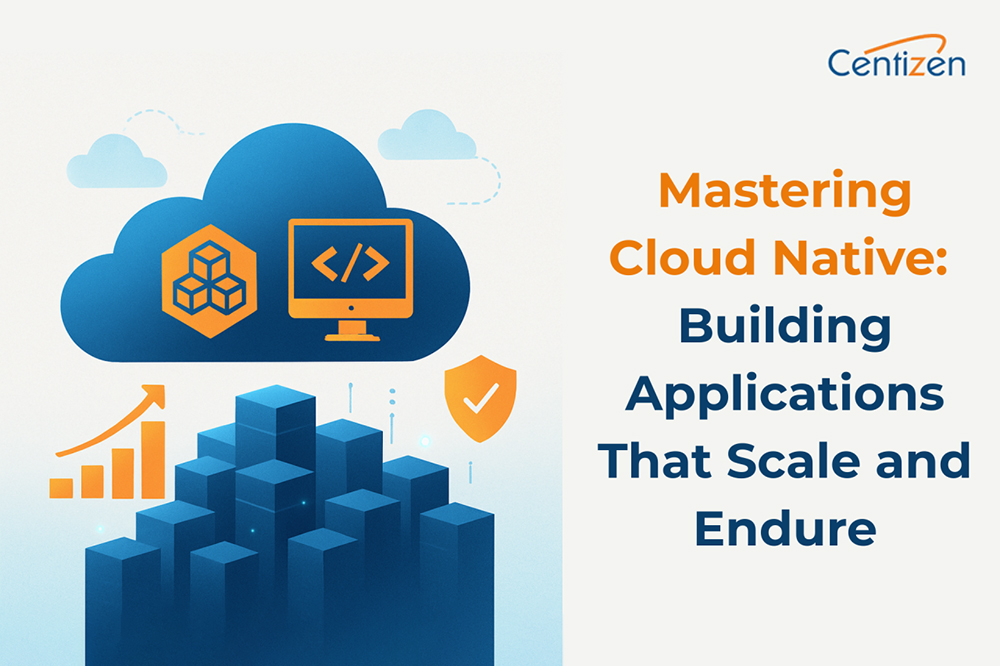Mastering Cloud Native: Building Applications That Scale and Endure

In an era where technology evolves at lightning speed, businesses need applications that are not just powerful, but also scalable, resilient, and future-ready. That’s the promise of cloud native development. But mastering cloud native isn’t about simply moving to the cloud — it’s about rethinking how applications are built, deployed, and managed from the ground up.
Let’s explore how organizations can harness the cloud native approach to build applications that scale effortlessly and endure gracefully.
What is cloud native?
Cloud native refers to designing and building applications specifically to leverage the advantages of cloud environments. Instead of treating the cloud like a traditional data center, cloud native embraces the dynamic, scalable, and distributed nature of modern cloud infrastructure.
Cloud native applications are typically:
- Microservices-based – Broken into independent services that work together.
- Containerized – Packaged with everything needed to run consistently anywhere.
- Dynamically orchestrated – Managed and scaled automatically with tools like Kubernetes.
- Automated – Built, tested, and deployed using continuous integration and delivery (CI/CD) pipelines.
The goal? Faster development, higher scalability, and greater resilience.
Why cloud native matters
- Rapid innovation: Develop and release new features faster.
- Elastic scalability: Scale up or down based on demand without disruption.
- Built-in resilience: Quickly recover from failures and maintain high availability.
- Optimized costs: Use cloud resources efficiently, paying only for what you need.
- Global reach: Deploy applications across regions to serve users worldwide with low latency.
Cloud native isn’t just a technology shift — it’s a competitive advantage.
Core pillars of cloud native development
1. Microservices architecture
Rather than building a single, massive application (monolith), break it down into smaller, independent services. Each microservice focuses on a specific business function and can be developed, scaled, and deployed independently.
Pro tip: Design services to communicate through lightweight APIs to keep the system modular and adaptable.
2. Containers and kubernetes
Containers package applications and their dependencies, ensuring they run consistently across environments. Kubernetes orchestrates these containers, handling deployment, scaling, load balancing, and self-healing.
Pro tip: Use Kubernetes-native features like auto-scaling, rolling updates, and self-healing pods to build resilience by design.
3. Continuous integration and continuous delivery (CI/CD)
Automate your software lifecycle. Cloud native teams integrate code changes frequently, test automatically, and deploy seamlessly. This minimizes downtime, reduces errors, and speeds up innovation.
Pro tip: Implement security checks and automated rollback mechanisms into your CI/CD pipelines.
4. Observability and monitoring
Cloud native systems are dynamic — you must be able to observe what’s happening. Implement comprehensive logging, metrics, tracing, and alerting to detect issues early and maintain system health.
Pro tip: Use tools like Prometheus, Grafana, Fluentd, and Jaeger to monitor and trace across your cloud native stack.
Best practices for building scalable, resilient cloud native applications
- Design for failure: Always assume that parts of your system will fail. Build in redundancy, graceful degradation, and automatic recovery.
- Embrace horizontal scaling: Instead of upgrading to bigger servers, design services that can replicate and scale horizontally based on load.
- Use managed cloud services: Offload operational complexity by leveraging managed databases, message queues, storage, and monitoring services offered by cloud providers.
- Automate everything: From infrastructure provisioning to testing and deployments, automation reduces human error and accelerates innovation.
- Prioritize security: Secure containers, encrypt communication, manage secrets properly, and implement zero-trust network principles.
- Practice chaos engineering: Regularly test how your systems behave under failure scenarios to improve resilience proactively.
Common challenges and how to navigate them
| Challenge | Strategy to Overcome |
|---|---|
| Complex service communication | Implement service meshes like Istio for secure, reliable communication. |
| Operational complexity | Use cloud-managed Kubernetes (like GKE, EKS, AKS) and automated tooling. |
| Cultural shift in teams | Foster a DevOps culture; promote collaboration between developers and operations. |
| Security in dynamic environments | Embed security practices directly into your pipelines and architectures (DevSecOps). |
| Managing costs at scale | Set up cost monitoring and alerts early to optimize usage and prevent budget overruns. |
The future is cloud native
As organizations move deeper into the digital age, resilience, speed, and scalability will no longer be optional — they will be core expectations. Mastering cloud native development equips teams to meet these demands confidently.
Whether you’re a startup building your first application or an enterprise modernising legacy system, adopting a cloud native approach can future-proof your technology investments and unlock new levels of growth.
Our services:
- Staffing: Contract, contract-to-hire, direct hire, remote global hiring, SOW projects, and managed services.
- Remote hiring: Hire full-time IT professionals from our India-based talent network.
- Custom software development: Web/Mobile Development, UI/UX Design, QA & Automation, API Integration, DevOps, and Product Development.
Our products:
- ZenBasket: A customizable ecommerce platform.
- Zenyo payroll: Automated payroll processing for India.
- Zenyo workforce: Streamlined HR and productivity tools.
Services
Send Us Email
contact@centizen.com
Centizen
A Leading Staffing, Custom Software and SaaS Product Development company founded in 2003. We offer a wide range of scalable, innovative IT Staffing and Software Development Solutions.
Call Us
India: +91 63807-80156
USA & Canada: +1 (971) 420-1700
Send Us Email
contact@centizen.com
Centizen
A Leading Staffing, Custom Software and SaaS Product Development company founded in 2003. We offer a wide range of scalable, innovative IT Staffing and Software Development Solutions.
Call Us
India: +91 63807-80156
USA & Canada: +1 (971) 420-1700
Send Us Email
contact@centizen.com






